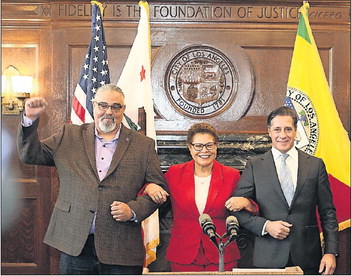L.A. schools, union reach deal
District OKs 30% pay hike, benefits for 30,000 workers
NEW YORK TIMES
LOS ANGELES — The union representing 30,000 education workers reached a tentative deal with the Los Angeles Unified School District on Friday, following a three-day strike that had closed hundreds of campuses and canceled classes for 422,000 students earlier this week.
Local 99 of the Service Employees International Union, which represents support workers in the district, said that Los Angeles Unified, the second-largest school district in the nation, had met its key demands, including a 30% pay increase. The deal must still be voted on by the full union.
Mayor Karen Bass announced the deal Friday at City Hall with Max Arias, the executive director of Local 99, and Alberto Carvalho, the district superintendent.
“I am grateful that we were able to find an agreement to move forward today,” Bass said, adding, “I am hopeful that this is the beginning of a new relationship that will lead to a stronger LAUSD and a better future for its workers and students in the years ahead.”
During the strike, the union had pressed its case that many of its members made little more than the minimum wage and struggled to pay their bills in Southern California.
Local 99 members — who include gardeners, bus drivers, cafeteria workers and special education assistants — were joined by the Los Angeles teachers union, which is negotiating its own contract and had asked its 35,000 members to walk out in solidarity. All told, that meant as many as 65,000 school employees were part of the work stoppage.
The strike, which began Tuesday, was limited to three days, and schools had already reopened Friday morning, before Local 99 agreed to a tentative contract.
Local 99 members had been working without a contract since July 1, 2020. The new deal gives them a series of retroactive pay raises and runs through June 30, 2024, according to the school district.
The minimum wage will be set at $22.52 per hour, and workers employed as of June 30, 2021, will get a one-time $1,000 bonus, the district said. A $3 million educational and professional development fund for union members will also be created.
Arias said that his members’ salaries would increase by 15% upon ratification. After Jan. 1, their salaries would be about 30% higher than they were Tuesday, when the strike began.
“This has the potential for transformational change,” he said in an interview Friday night. “We want this to be a spark to rethink our schools, our values around education. When 65,000 education workers are telling the parents that we need to do this to improve the conditions, that’s powerful.”
The SEIU employees have argued that they represent about 40% of the school district’s workforce but less than 10% of its budget. The deal, however, could present a larger financial challenge for the district, because when one of its many unions negotiates favorable terms, the rest typically also demand them. Teachers, for example, make up the lion’s share of the district payroll, and are widely expected to take the SEIU deal into consideration in their contract negotiations. The teachers pointedly stood in solidarity with the SEIU employees, refusing to cross picket lines.
Both the school district and the union credited Bass, who took office in December, with helping broker the deal.
“She was absolutely magnificent in getting everybody to talk to each other repeatedly, even when things began going awry,” said Jackie Goldberg, the school board president. She said negotiations had also been eased with the help of a mediator.
Bass said in an interview Friday evening that she had informally been in conversations with the district and union leaders “for a couple of weeks” before the strike started, “but we kept it quiet.”
A former member of Congress, Bass has long been known for her ability to bridge differences, particularly among fellow Democrats, through quiet, back-channel conversations. Elected with the support of SEIU, she was a natural go-between, even though mayors in Los Angeles have little power over the schools beyond the bully pulpit.
Many of the support workers said this week that their positions were only part time, which means they must seek second or third jobs to pay their bills. At the news conference, Carvalho said the tentative deal would provide for additional hours of employment, as well as health benefits for part-time employees who work four or more hours a day, including coverage for their dependents.
“I have no doubt that this contract will be seen as a precedent-setting, historic contract that elevates the dignity, the humanity of our workforce, respects the needs of our students, but also guarantees the fiscal viability of our district for years to come,” Carvalho said. “Those were indispensable priorities for all of us.”
Hugo Montelongo, a special education assistant at a high school in the San Fernando Valley, said that “nothing compares to what we just achieved.” Montelongo, 52, said that he had worked for more than 20 years for the district and that he was passionate about working with students who were focusing on life skills. The labor agreement, he said, was a long-awaited sign that people like him are valued.
“We do it with love, but you can’t get by on love,” he said. “It feels like they’re finally respecting what we do, accepting that what we do is worth more.”
Montelongo said the agreement would allow him to work 35 hours a week, instead of 30, which will help him through the summer months when he does not receive a paycheck. Over the past year, his utility bills have soared, as have the costs of food, insurance and gas.
“Our wages weren’t keeping up with inflation,” he said. “In Los Angeles the cost of living is ridiculous.”


